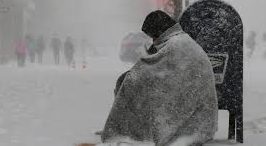Published by BlackCommentator, September 24, 2020
Winter in America: Is it time to stop pretending this country can move past its inherent racism?
 Winter in America. It’s the title song from the album of the same name written and performed by urban poet Gil Scott-Heron. Released in 1974, Scott-Heron’s music projected the conditions of African Americans during that period and which still ring true today. The imagery of winter – bleak, harsh, unforgiving – is not lost on the lyrics. The prophetic voice of Scott-Heron has been my personal soundtrack during the Black Lives Matter protests and I have concluded: it’s winter in America all the time for Black folks.
Winter in America. It’s the title song from the album of the same name written and performed by urban poet Gil Scott-Heron. Released in 1974, Scott-Heron’s music projected the conditions of African Americans during that period and which still ring true today. The imagery of winter – bleak, harsh, unforgiving – is not lost on the lyrics. The prophetic voice of Scott-Heron has been my personal soundtrack during the Black Lives Matter protests and I have concluded: it’s winter in America all the time for Black folks.
Black people have done much of what America has demanded of us to show that we are worthy of being part of the democratic experiment. We have fought and died heroically in all wars since the American Revolution when Crispus Attacks was the first to take a bullet for this country. We memorized state constitutions in order to vote and yet the Black vote remains provisional. We educated ourselves, even when it was illegal, as proof that we were not intellectually inferior. Black folks entertained generations with our song, music and dance, and with our athletic talents. Our inventions to make life easier, safer, and more productive have been gifts to the world.
Black people get killed by police and their proxies in the most ordinary of circumstances. Driving, shopping, walking, jogging, praying, shopping, playing, traveling, working, chillin’ and the other ways dramatized in #23Ways by Black celebrities such as Chris Rock and Beyoncé. The tears of Black mothers flow like an endless river going nowhere. Anti-blackness is everywhere.
Our forced free labor for nearly 250 years of working from sunup to sundown laid the foundation for this country to become the great economic superpower it is today. Add to that another 100 years in what Douglas Blackmon calls “slavery by another name,” when chattel slavery was supposed to have ended with emancipation but was replaced by forms of forced labor, such as convict leasing and sharecropping. The Black Codes legitimized the exploitation of men and women in a system where death would come long before a debt was paid off. This form of neo-slavery went well into the 20th century followed by the depressed wages of Black workers right up to the present. At any given period, African Americans have been the most unemployed, the most poorly paid, the last hired and the first fired. It is our ugly reality that working hard will never get us ahead permanently. Any meaningful progress is temporary at best.
When African Americans were told to get their own, we built the Black Wall Streets in communities across the country. Those hard-earned successes were never celebrated by white America, instead they became the target of racist massacres fueled by hate and envy.
Black people must resign ourselves to the historical truth that we may never be accepted into the American family. Despite our persistent efforts to contribute to U.S. society and fit in as full-fledged, respected citizens, Black people are continuously met with contempt and cruelty. That we’ll never be considered equals is a hard pill to swallow given all the hoops and hurdles that we’ve gone through. The rules keep changing and the goal posts keep moving, guaranteeing we will never cross the proverbial finish line to full humanity. Black bodies continue to be monetized or weaponized, rarely humanized.
White people must own up to their ugly history, and that they are down with some or all parts of racism. Racism remains intact because it has served to protect white interests and preserve white supremacy. With few exceptions, white people have been actively or passively complicit in the dehumanization of Black folks by supporting laws – written and unwritten – that keep us out of their neighborhoods, schools, workplaces and government. White folks have sat on juries, committees, councils and boards of this and that to ensure that our history, culture, homesteads, jobs and schools would be controlled or destroyed. Whites have borne witness or actively participated in the control of Black movement – geographically, economically, socially and politically – for the past 400 years.
Black folks and white folks have to confront the inescapable truths staring at us today as we contemplate the path forward. For Blacks, is it time to draw the collective conclusion that we will never be accepted in this society and plan accordingly? For whites, can they completely sever their historical and psychological ties to white supremacy that deny the humanity of all non-whites?
I believe this is where we are in the current and uncomfortable discussion of structural racism and racial hatred. This moment of racial upheaval should move this discussion in radical ways and remove any pretense that we are all striving for the lofty principles of a democracy.
Gil Scott-Heron’s refrain in Winter in America laments that we aren’t fighting the real fight because we don’t know “what to save.” If those of us living in America don’t figure out soon what’s at stake, there are a lot more winters ahead for all of us.



